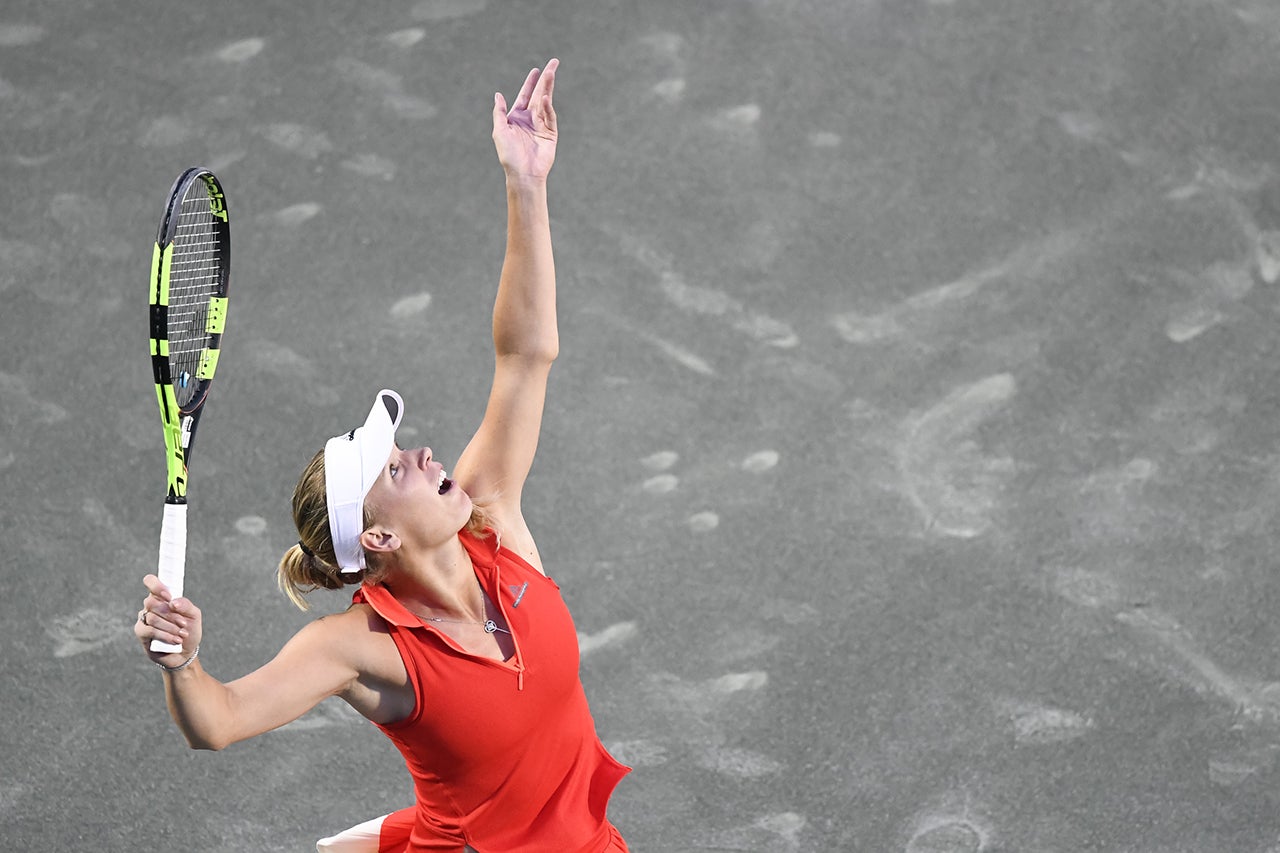by Laurie Lattimore-Volkman
Joel Drucker once pined to be an academic.
So he spent a week following well-known Columbia University journalism professor Michael Schudson through the inner-workings of higher education, interviewing the professor while also “living in his university world.”
It didn’t take more than a week for Drucker, a journalist and author, to realize the life of a Ph.D. would never have been the one for him.
But a few hours “professing” to dozens of College of Charleston communication students this week about writing satiated his ongoing desire to inspire young people to take up the craft of storytelling. Drucker stopped by campus while covering the Volvo Car Open for the Tennis Channel.
“There are no boring stories,” says Drucker. “There are only bored writers.”
A feature writer and author on all things tennis, Drucker originally wanted to be a lawyer. As a political science and cultural-social history major at the University of California-Berkeley in the late ’70s and early ’80s, Drucker discovered a passion for law, politics and culture amid the tumultuous events of the decade.
He had planned to spend the summer after he graduated as a writing intern for political newspaper Roll Call in Washington, D.C., but a random opportunity to get paid to write about what proved his true love — tennis — immediately trumped an unpaid internship on Capitol Hill.
“At the time I had a lot more passion than skill,” he says. “But I knew I was put on this earth to write about tennis.”
During a 10-year detour working in public relations, Drucker developed the necessary writing skills for telling a concise story while also learning how to write about a host of things he didn’t know about or didn’t necessarily care about.
“It was good to get out of tennis and learn to write about other things and learn to bring some passion to them,” Drucker says, adding that he also learned important things like how to tie a tie too.
But for the better part of three decades, Drucker has found a way to write about tennis, including in his recently published book, Don’t Bet on It.
When the veteran writer stopped in to several CofC communication classes this week, he covered everything from tennis to writing to the Beatles — and even Alexis de Tocqueville.
“I bet I’m the only person who has ever written a tennis story quoting de Tocqueville,” Drucker says, recalling his 2012 Huffington Post piece “The Education of a Tennis Player,” which highlighted comments from Democracy in America to bemoan the isolation tennis inevitably creates for its participants.
But while quoting a French philosopher — or comparing each major tennis tournament to a member of the Beatles — might seem odd to the casual tennis fan, this is the heart of one of Drucker’s main admonitions to aspiring writers — read a lot.
Read history, read pop culture, read magazines, read novels. Read as much as possible — and then try to read more.
“Story ideas come from being engaged, being interested,” says Drucker, whose background in social history as well as his passion for tennis have often intersected. Just this week he wrote a feature asking German tennis player Andrea Petkovic to compare her favorite literary authors to famous tennis players.
“I don’t write about sports and tennis,” he admits. “I write about people.”
One of those people was Billie Jean King — the iconic women’s tennis star whose name was sadly unfamiliar to nearly all the CofC students in the room.
No matter. Drucker stopped to give a quick lesson on one of the most important female athletes in history, responsible in large part for the many milestones women’s athletics has reached in the past 60 years, and someone he has interviewed several times.
While doing a feature in 2003 on King and her doubles partner Karen Hantze Susman, who together won three Grand Slam doubles titles, Drucker noted to the students it was actually the lesser known Susman who gave him the more interesting story that day.
“How do you think you’d feel the night before playing in Wimbledon?” Drucker asked the class. Most responded as expected – “nervous, unable to sleep.”
That was exactly what Drucker figured the tennis star would say. But it turned out Susman’s husband actually had to wake her up the morning of one of the biggest matches of her life.
Then she went out and won Wimbledon at age 19.
Forty-one years later, Susman’s nonchalance over the magnitude of that tournament and that win was still evident. When Drucker asked her about the Wimbledon trophy, she mentioned in passing that she “had recently found it in the pantry” while looking for a can of tuna.
“If she kept it on a mantle somewhere, that wouldn’t be interesting,” Drucker says. “But in the pantry? Now that was interesting.”
And that rather minor detail that few, if any, writers had ever discovered ultimately made for a unique angle on Drucker’s story.
Details like that are the keys to compelling stories, Drucker says, and they come from asking a lot of questions and constantly researching the subject.
“Research is writing because you are organizing your ideas and always thinking about how you will use that info,” Drucker says. “You should always be thinking that you are your audience’s student and you need to learn everything you can so you can tell them.”
The freelancer likes to joke that writer’s block just does not exist in his world because credit card statements do — and nothing is more motivating for writing than a bill to be paid.
“I’m just not a big believer in writer’s block,” he says. “Just start saying things and don’t worry about the perfect story. You don’t have to write the great American sentence. You just need to write the very good one.”
Laurie Lattimore-Volkmann is an adjunct faculty member in the Department of Communication.
Images provided.





